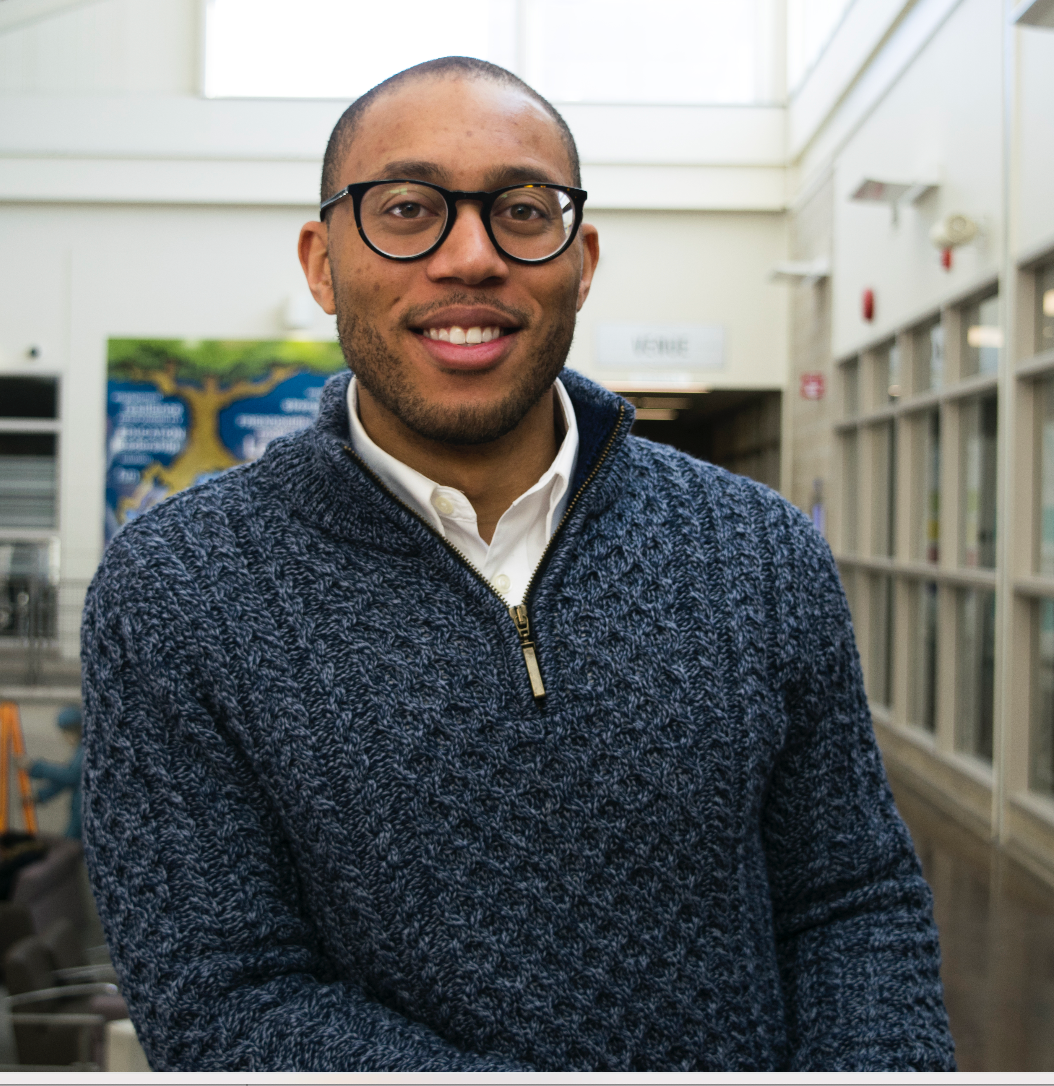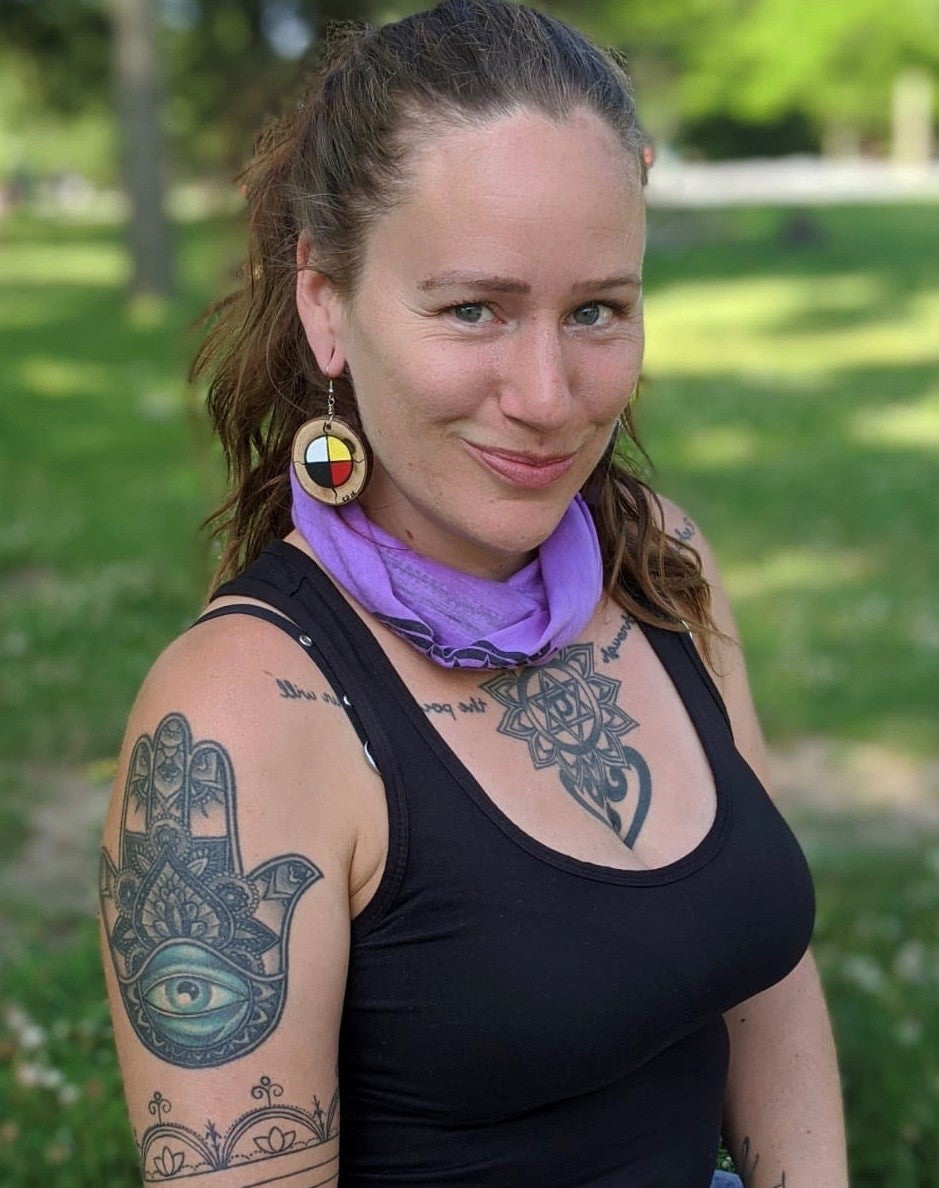
Welcome back to our fifth issue of The Catalyst Anti-Racism newsletter.
Each month, we have a different President’s Anti-Racism Taskforce (PART) working group co-chair introduce the newsletter. We hope this will give you a deeper understanding of the dedicated people behind our work.
This month, our message comes from Robin Stadlbauer, co-chair of the Race, Culture, and Ethnicity Awareness working group.
In this issue:
- Message from the Chair
- Anti-racism across campus
- Staff feature
- Department feature
- Working group update
- Upcoming events
Message from the Chair
 Robin Stadelbauer, co-chair of the Race, Culture, and Ethnicity Awareness working group
Robin Stadelbauer, co-chair of the Race, Culture, and Ethnicity Awareness working group

Boozhoo,
Given my roles at the University, as the Indigenous Initiatives coordinator and co-chair of PART’s Race, Culture, and Ethnicity Awareness working group, I constantly strive to raise awareness about opportunities for our community to learn more about and be involved in the truth and reconciliation process. One such opportunity is the newly announced National Day for Truth and Reconciliation on September 30. This day represents one of many commitments from the Government of Canada, for the people of Canada, to recognize and learn the history and ongoing legacies of the Indian Residential School system.
It is important for all Canadians to not just become aware of the severity of the residential school system, but to develop a deeper understanding of how this act of cultural genocide and other injustices committed by the Canadian government and churches, continue to impact all of us living in Canada today.
I would love to see the University community move beyond just reflection on the National Day for Truth and Reconciliation, by committing to deepening current understanding, and if possible, participating in community events, and engaging in meaningful conversations with friends, co-workers, or family.
I take this opportunity to encourage you to participate in the events and activities being hosted, not only by the Indigenous Initiatives office but also by other groups across campus to commemorate the National Day for Truth and Reconciliation. A list of events and activities can be found here.
As the Honorable Murray Sinclair, the 2021 National Indigenous History Month Keynote, told us during the virtual session at UWaterloo in June, responsibility for reconciliation falls on each of us. Our thoughts, understandings, and actions directly shape and create societal and governmental behaviour and actions. The University, through individual and collective actions, has the opportunity to bring about a positive impact by working together to catalyze truth and reconciliation.
In the spirit of collaboration and connectedness, let’s continue to foster learning, understanding, and engagement as we make greater strides towards reconciliation.
Miigwech

THE CATALYST
Subscribe now to receive each issue of this newsletter direct to your inbox
Anti-racism across campus
October anti-racism book club

An educator with a background in teaching English and History, Angel Hammoud has taught in places like Kuala Lumpur and Fort Nelson in BC. He has been a teacher in the WRDSB for more than 11 years. As a cisgender, Southeast Asian male, Angel is keenly aware of the importance of facilitating knowledge sharing and discussions about xenophobia and racism. He works with teachers and administrators at the elementary and secondary level, helping them to become more empathetic, equitable, and inclusive educators.
Angel looks forward to leading the discussion on "The Inconvenient Indian." He considers the book to be an important read because, although approaching ten years since its publication, King vividly describes the indignity and mistreatment that Indigenous people experience, which sadly still persist.
"It seems odd to remark," he mused, "but The Inconvenient Indianis at times equal parts hilarity and heartbreak. King speaks about the erasure of entire languages and cultures with a kind of humour and clarity that makes those discussions somewhat easier to hear."
Why is it important for settlers to facilitate and lead discussions like these? “Ultimately, the onus to educate settlers about the history of this 500-year relationship should not be solely on Indigenous people," explained Sara Anderson, manager, Research Program Development and Partnerships, Indigenous Initiatives and coordinator of PART's Educational Environment and Development of Learners working group. "It is important to demonstrate that settlers can engage in conversations about historical and contemporary events and issues that impact Indigenous communities in a manner that is respectful and does not appropriate Indigenous voices. This book club session aims to achieve this purpose,” she concluded.
Both Sara Anderson and Angel Hammoud believe that King provides context for the current realities of Indigenous communities by sharing a historical narrative using humor and storytelling. They hope attendees gain an understanding of the shared history of this land we now call Canada and the resilience and strength of Indigenous peoples.
Register for the October Anti-racism book club here.
University of Waterloo equity survey: Q&A with Jermal Jones, manager, Equity
The University of Waterloo launched an equity survey in June 2021 to almost 50,000 students, and employees, with the intention to confidentially collect demographic data and better understand the composition of our community. This will be an ongoing initiative to ensure that the institution has an accurate picture of its community, even as new students and employees join the University. Summarized results will be produced by Institutional Analysis & Planning (IAP) and with feedback from members of the Equity Data Advisory group.

Why do an equity survey?
An objective of the University's strategic plan is to improve the representation, participation, and engagement of equity-deserving groups within our community. Collecting equity data is important because it aids university leadership in taking concrete steps to identify and remove institutional barriers to equity. By participating, we are all contributing to Waterloo’s vision of a more equitable work and learning environment for all.
How will the University use this information?
The survey results will be used to help the university, faculties, and academic support understand how to improve the representation of equity deserving groups, and to increase their participation in and benefits from the programs and services that are offered. The goal is to create a more equitable campus which includes spaces, programs, and supports for equity-deserving groups.
Can you share any updates on preliminary statistics?
The best way to get an update on survey response rates is to check the recently launched Leader Board webpage. This tool showcases participation rates of the equity survey across campus. You can help increase your unit’s participation rates by completing the survey before Oct 31. For example, currently, Environment is the faculty to beat, among all faculty areas!
If I haven’t already, how can I complete the survey?
Students and employees who have not yet completed the survey receive a mid-month reminder to participate via email from UWaterloo Communications (msc-communications@uwaterloo.ca).
Students and employees can search their Waterloo inbox for the subject line "Take Waterloo’s Equity Survey Today." In this email, they will find a participation link that is unique to them. Once completed, they will no longer receive reminders to participate. Students and employees can also locate a link to participate in the Learn and Workday alerts, available as of September 20.
A snapshot of participant data, from mid-June to Oct 31, will be included from the first round of data collection, expected to be released in late fall 2021. It’s very important that we have as high a participation rate across campus so that those reports reflect the makeup of our campus community. We are requesting that members of our community take five minutes to complete the survey, which will contribute towards creating an inclusive environment.
Where can I go to learn more?
Please explore the Equity Survey Information webpage. You can also listen to episode 103 of the Beyond the Bulletin podcast, which will be available from Friday, September 24, 2021, at 8 am. A segment of that episode features Jermal Jones speaking with host Pamela Smyth about the equity survey.
Staff feature
 Meet Jaydum Hunt, interim director of Shatitsirótha (Waterloo Indigenous Student Centre)
Meet Jaydum Hunt, interim director of Shatitsirótha (Waterloo Indigenous Student Centre)

Jaydum Hunt’s ancestry is Bay of Quinte Mohawk from Six Nations, German and Irish. She is part of the Kitchener-Waterloo urban Indigenous community, living and working on the Haldimand Tract and the traditional territories of the Attawandaron, Anishinaabeg, and Haudenosaunee Peoples. Recently appointed as the interim director of Shatitsirótha (Waterloo Indigenous Student Centre), Jaydum Hunt’s responsibilities include directing the operations of the center, making new cross-campus connections, and developing and strengthening relationships with campus and community partners to support Indigenous students.
Jaydum will be completing her Master of Arts in Industrial and Organizational Psychology from the University of Waterloo this fall. As an Indigenous student on campus, Jaydum understands firsthand the challenges that these students face within the institution. In her new role, she hopes to work closely with key stakeholders to help eliminate these challenges for both current and future Indigenous students.
“As interim director of Shatitsirótha, I hope to create meaningful engagement opportunities for Indigenous communities, stakeholders, students, and staff,” she said. “We are working closely with the Indigenous Initiatives office and other equity-seeking partners on several cross-campus projects aimed at increasing awareness of and access to services and supports available to Indigenous students at Waterloo,” she explained.
In addition to providing safe spaces for cultural enrichment, Waterloo Indigenous Student Centre (WISC) offers a wide range of culturally relevant and holistic programs and services to Indigenous students. WISC recently collaborated with Campus Wellness to contract an Indigenous counsellor who will at times work out of the office to provide counselling to Indigenous students. WISC also engages with the Graduate Students Association (GSA) to provide supports for Indigenous graduate students.
While WISC and the Indigenous Student Association (ISA), an Indigenous student-run collective, operate as two separate entities, they have historically collaborated on several joint initiatives that impact Indigenous student life on campus. Jaydum Hunt was a member of ISA's executive from 2018-2021 and has been involved in this work since coming to the University for undergraduate studies. She is also a member of PART’s Educational Environment & the Development of Learners working group. Jaydum plans to continue to work with groups, departments, and units across campus committed to advancing anti-racism initiatives.
It is extremely important to Jaydum that Shatitsirótha is reaching all Indigenous students on campus. She encourages Indigenous students to visit the center to learn more about services, supports, and resources that imbue the values and rights of Indigenous peoples and cultures.
Department feature

The Indigenous Initiatives office was established in 2020, following an Indigenization strategy announced in 2018. Under the direction of Jean Becker, senior director, Indigenous Initiatives, who also serves as interim associate vice president, Human Rights, Equity & Inclusion, the office is responsible for advancing the goals of the Truth and Reconciliation Calls to Action.
The Indigenous Initiatives office operates as a central hub for First Nations, Metis, and Inuit researchers, students, faculty, staff, and allies to receive guidance, support, and resources. The office also offers training to help the campus community gain a deeper understanding of the historical and current realities for Indigenous people.
Over the past 18 months, the Indigenous Initiatives team has accomplished several significant achievements intended to bring about meaningful, systemic, transformative, and lasting change. These include:
- Developing a long-term vision grounded in decolonization and finalizing a 2021-2026 Indigenous Initiatives strategy plan (ongoing).
- Establishing an Indigenous Advisory Circle, comprised of members of the Waterloo Indigenous community to provide guidance on the direction of decolonization and indigenization.
- Working with faculties and academic support units (ASUs) to address the gross under-representation of Indigenous people throughout the institution. For example, hires will be made in Human Resources, the Student Success Office, Counselling Services the Faculty of Science, the School of Environment, Enterprise and Development, the Centre for Teaching Excellence, among others.
- Advising the Office of the Provost on the Cluster Hire initiative, which aims to hire 10 Indigenous faculty to increase the number of Indigenous scholars at Waterloo.
- Advising the Office of Research on hiring a manager, Research Program Development and Partnerships, Indigenous Initiatives to support faculty in Indigenous related research.
- Creating Indigenous spaces across campus with a suite in EC5, an outdoor Indigenous gathering space in the North Commons, and designated smudging rooms at various locations around the Waterloo campus.
- Facilitating the launch of the Blackberry $5000 entrance scholarship for Indigenous students, which commences in the fall.
- Working with Retail Services to procure Indigenous stocks designed by Indigenous artists for the W Store.
- Consulting with the Schools of Architecture and Engineering to hire Indigenous Elders to indigenize their schools.
- Conducting Indigenous awareness workshops for the campus community.
Asked about her hopes for the Indigenous Initiatives office going forward, Jean Becker said, "We recognize that the structural changes needed to respond to the TRC, require Indigenous leadership throughout the institution. I hope our efforts will have a transformative impact on the lack of knowledge many have about Indigenous history and current affairs, particularly Canada’s relationship with Indigenous peoples."
"Understanding the history and continued oppressive laws impacting Indigenous nations is critical to developing mechanisms for change and reconciliation," she concluded.
Working group update
 From Colleen Phillips- Davis, co-chair, Educational Environment and the Development of Learners (EEDL)
From Colleen Phillips- Davis, co-chair, Educational Environment and the Development of Learners (EEDL)

The Educational Environment and the Development of Learners (EEDL) working group is comprised of dedicated students, staff, and faculty, committed to developing transformative changes to dismantle institutional barriers and strengthen and sustain inclusion and belonging.
Since receiving the mandate in January 2021, the EEDL working group has been conducting environmental scans, consulting with multiple stakeholders across campus and beyond, and soliciting feedback, to inform the development of anti-racism recommendations.
Included in these recommendations are developing BIPOC entrance and other scholarships and advising on approaches for introducing a transitional year program for high-school students within racialized groups. These recommendations will help to guide the development and implementation of strategies that identify and eliminate barriers that may prevent racialized individuals from enrolling and succeeding in higher education.
"For example," said Colleen Phillips- Davis, co-chair of the EEDL working group, "prospective or existing students may have insufficient financial support for their academic journey, or they may struggle in university, as they may lack the implicit knowledge, social capital, and cultural competencies to succeed in an academic environment."
According to Phillips-Davis, an environmental scan of other universities, including the U15s and some Historical Black Colleges and Universities (HBCUs) in the United States, was conducted to obtain information on entrance scholarships and transitional year programs.
"Many of these universities provide scholarships and programs for students from racialized groups, allowing them to not only enroll at the institution but to succeed in a post-secondary environment," she explained.
As the working group continues to make progress on its responsibilities, the team is confident that once recommendations are implemented, the University will increase equitable access to academic programs for racialized groups, creating a more diverse, vibrant, and inclusive learning environment, which gives these groups a better chance for success.
"We are all on this journey together to create a legacy of inclusion and belonging that will be embedded in the DNA of the University,” she said.
Upcoming events
 Mental Health and Anti-racism with Anthony McLean
Mental Health and Anti-racism with Anthony McLean

Diversity, anti-racism, and mental health speaker, Anthony McLean will give the opening keynote address at the 5th annual Keeping Well at Work (KW@W) virtual conference, which takes place October 13 to 19, 2021. Keeping Well at Work, organized by the Organizational & Human Development (OHD) in partnership with the Healthy Workplace Committee is open to all staff and faculty at the University of Waterloo.
Anthony McLean, in his talk slated for Wednesday, October 13, at 10:30 am, will address the intersection of mental health and anti-racism. Anthony will also engage with participants during a live Q&A session. Staff and faculty interested in attending the event are invited to submit questions beforehand during registration on Portal. Jermal Jones, manager of Equity will be the moderator of this session.
Anthony has delivered hundreds of inspiring talks across Canada, the US, and Australia on diversity, anti-racism, and mental health. His research-backed tools and actionable strategies leave his audiences inspired to bring their best every day.
Acts of racism (experienced or witnessed) can be triggering and potentially damaging to mental health. To do the intentional and active work of anti-racism in a way that is sustainable, it is important to take care of your mental health. Building community understanding, empathy, learning, and healing related to mental health through a lens of anti-racism is not only timely, but it is a shared responsibility.
“Our hope is that Anthony’s session will support cross-campus efforts around anti-racism advocacy, awareness, open-mindedness,” said Dana Evans Laity, Learning and Development specialist at OHD. “We hope this session encourages members to understand the impact that racism and oppression can have on mental health and open doors for candid conversations about anti-racism and mental health stigma in a community setting.
Registration for the two-day virtual conference opens Tuesday, September 21, 2021, at noon. The organizers promise a stellar line-up of concurrent workshop sessions covering a variety of themes, such as nutrition, mental health, physical well-being, wellness through an equity lens, community and campus wellness, and overall personal health. Employees can register through Portal and are encouraged to learn more about registration, the conference line-up, schedule, and other wellness inspiration here.